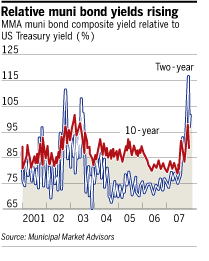Municipal bonds
Roula Khalaf, Editor of the FT, selects her favourite stories in this weekly newsletter.
Would a monoline meltdown massacre municipal bond markets? Judging from where yields on “munis” are trading relative to US Treasuries, fixed-income investors seem to think so. As interest income on munis is usually tax-exempt, their yields tend to be lower than those on Treasuries – about a fifth lower, on average, over the past 24 months, according to Municipal Market Advisors, a research firm. Right now, two-year munis are yielding roughly the same as Treasuries.

That partly reflects falling Treasury yields as investors have sought safe havens. But it also reflects doubts hanging over monoline insurers such as MBIA. About half the $2,600bn of US muni bonds outstanding are guaranteed against default. The fear is that, if insurance is impaired, many bonds will need to be re-rated, causing significant disruption.
Such disruption, however, would probably be temporary. One reason
is the muni market’s inherent credit quality. Default rates on muni bonds are very low, and their ratings are not easily comparable with corporate issuers. Moody’s has found the aggregate default rate for general obligation, water and sewerage muni bonds across all investment grade levels was a mere 0.1 per cent between 1970 and 2006. In the corporate world, even triple-A bonds have a historic default rate five times that level.
Monoline insurance mainly serves to boost muni market liquidity. Two-thirds of munis are held by individuals or mutual funds buying
on their behalf. Insurance helps to take the effort out of choosing between thousands of different muni issues and homogenises them from the buyer’s perspective.
Present difficulties for the insurers have more to do with attempts to diversify away from just insuring muni bonds, so the original model itself is unlikely to disappear. For muni issuers with weaker credit ratings, however, even temporary disruption could mean painful decisions on public spending. Beyond them, institutions holding munis face the unappealing prospect of potential losses on yet another class of assets previously regarded as rock solid.
Comments